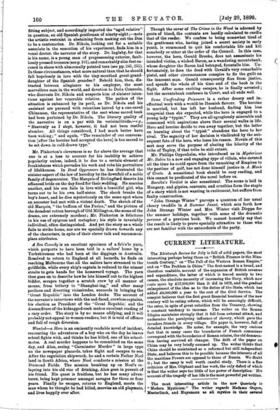CURRENT LITERATURE.
The Edinburgh .Review for July is full of solid papers, the most interesting perhaps being those on " British Finance in the Nine- teenth Century," on "The Fall of the Western Roman Empire," and on " The Problem in China." The first-named is a broad, and therefore readable, account of the expansion of British revenue and expenditure, the latter of which is traced mainly to two causes, the absolute necessity of increasing the Navy, which now costs more by £17,000,000 than it did in 1875, and the gradual enlargement of the idea as to the duties of the State, which has added 48,000,000 a year to the cost of the Civil Service. The essayist believes that the first great financial business of the new century will be rating reform, which will be amazingly difficult, the rates, in spite of great subsidies from the Treasury, showing a constant tendency to increase. The writer on the Roman Eiiipire maintains strongly that it fell from external attack, and underrates the paralysing influence of slavery, which gave the invaders friends in every village. His paper is however, full of detailed knowledge. He notes, for example, the very curious fact that in many cases the boundaries of French communes correspond with the boundaries of Roman estates, the old demarca- tion having survived all changes. The drift of the paper on China may be very briefly summed up. The writer thinks that China should be maintained as a reformed but still independent State, and believes this to be possible because the interests of all the maritime Powers are opposed to those of Russia. We doubt it ; but the essay is well worth careful study. There is a fine criticism of Mrs. Oliphant and her work, the only defect of which is that the writer says too little of her power of description. His account of the tragedy of her life is the most powerful yet written.


































 Previous page
Previous page